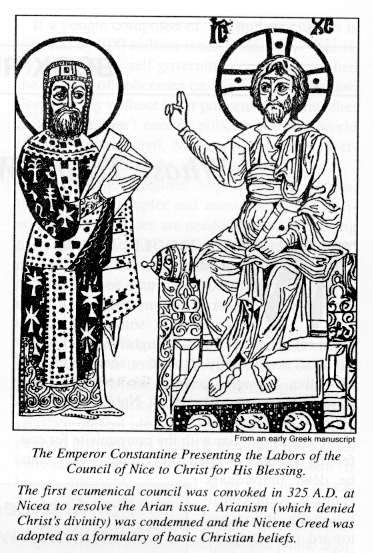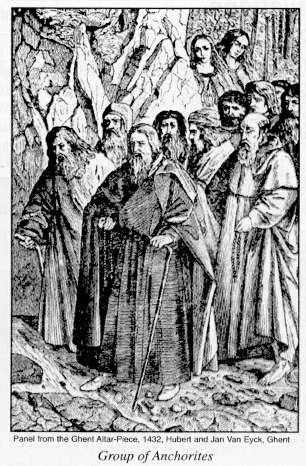



Why would any forward thinking person, other than an academic, care to read a book on Christian heresies? Who cares what some ancient religious rebels misguidedly thought? Joan O'Grady advances some highly instructive answers to these and other relevant questions in her book Early Christian Heresies (Barnes & Noble, New York, 1985).
We are all familiar with the prerequisite for conferring sainthood upon individuals-they must be dead individuals. Humans seem constitutionally indisposed toward permitting the living to merit holiness. Being in a body is enough, in itself, to exclude membership in the ranks of the sanctified. Memory and imagination must work their dubious alchemy on the one who can no longer speak and act in a mortal, fallible, which is to say, human, manner.
This same human perversity, which posthumously accorded Divinity upon a crucified Nazarene, can operate at the group level, whereby a religious movement, viewed at its inception as radical and dangerous, so transforms prevailing belief and thought patterns that it becomes an institutional norm by which other new ideas and practices may be judged wayward and wrong.
Today a number of suspect sects are being branded as cults by the Chicago-based Cult Awareness Network (CAN). CAN lists seven distinguishing characteristics which, they allege, constitute a cult profile: mind control, charisma, leadership, deception, exclusivity, alienation, exploitation, and totalitarian world view. It would be all too easy, by applying these criteria, to see how, from the vantage of the established Jewish religion of Jesus' time, he and his associates were a cult. In the eyes of the alarmed and outraged Pharisees and Sadducees, Jesus and his ilk were fanatics and troublemakers. In fact, for first-century Jews and Romans (whose religion was both polytheistic and anthropomorphic), Christianity was not merely heresy, it was blasphemy. It did not subtly diverge from the status quo, it represented a radical departure.
Early Christian Heresies makes clear that there can be no heresy without an orthodoxy. But it took half a millennia to posit and consolidate a Christian orthodoxy, so that "it was often due to the very heresies themselves that doctrines were formulated and reformulated." The body of Christian dogma came into being through the painful process of identifying its beliefs in fixed terms and then discriminating those beliefs from what did not accord with them. This was no easy task, as the doctrinal history of the catholic (universal) church makes patently clear.
For one thing, many church fathers thought that the very act of defining distorts the understanding of that which lies beyond logic. As St. Hilary, Gallic bishop of the fourth century, said, "The error of others compels us to err in daring to embody, in human terms, truths which ought to be hidden in the silent veneration of the heart."
O'Grady wonders whether the inevitable distortion incident to doctrinal formulation was not the necessary price orthodox Christianity had to pay to become a world religion-which otherwise might have fractured into a myriad of divergent sects. Some of the earliest heresies were precisely those that were reacting against the increasing legalism and intellectualism of the Great Church as it inherited much that was practically useful from the law and administration of the Roman Empire. The Montanists, for instance, a powerful force among second-century Christians, rebelled against the increasing temporality of the Church and resented the diluting and mainstreaming of Christianity. Likewise, the Marcionites aimed at a simple, ascetic form of Christianity, emphasizing mercy and forgiveness. They opposed the surge of speculative ideas and Old Testament legalism.
Gnosticism especially advanced high truths which have seen no counterpart until the advent of Rosicrucian Teachings in modern times. Many schools of Gnostics believed that the heavenly Christ entered the man Jesus at the moment of his baptism by John and left him at the crucifixion. Valentinian Gnostics correctly (according to Western Wisdom Teachings), saw the God of the Old Testament (Jehovah-the Holy Spirit) as a lesser Power than the Father of All, Who did not create a universe from nothing (as per Genesis), but contained all within Himself.
In the most complete apocryphal gospel extant, the Gospel of Thomas, a 400 A.D. Coptic text based on a second-century Greek original, called by the Gnostics The Secret Sayings of Jesus, true religious experience is defined as "the recognition of one's own identity" and knowing one's Self as one of the "sons of the Living Father. But if you do not know yourself, then you are in poverty and you are poverty." In this Gospel, the Kingdom of Heaven is never seen as future consummation but exclusively as a state within. O'Grady writes that "knowledge of where a man comes from, who he is, and where he is going is the kernel of Gnosticism." Does this sound familiar?
Valentinus saw man as a spiritual spark come from God, going through cycles of rebirth, requiring for his salvation ("the redemption of the inner spiritual man") "a Redeemer, who came to earth and found his way back to the Father of All," thus becoming "a Way, a Gnosis, a Discovery, and a Confirmation."
Experiential (not purely intellectual) knowledge, knowledge, as students of Rosicrucian philosophy would say, resulting from living the life, is Redemption. "If one has knowledge, he is from above...Having knowledge, he does the will of the One who called him...He who is to have knowledge in this manner knows where he comes from and where he is going." So believed and understood many Gnostics, who were, nevertheless, eventually marked as heretics by the "universal" church.
Early Christian Gnostics, like Clement of Alexandria (c. 150-215 A.D.) and his pupil Origen, managed to be retained in the expanding fold, though Clement wrote that "The true gnostic is the Lord's brother and friend and son" because his wisdom derives from the continued practice of faith and love. For Clement, in fact, Christianity was essentially a philosophy in its original sense of "love of wisdom."
Docetism and Manichaeism both grasped the truth that Christ was "a divine being clothed in the semblance of man." Both repudiated the anthropomorphism (an angry, jealous God) of the Old Testament. But neither (at least in their exoteric form) could resolve the question of good and evil and were caught in an irresolvable dualism.
Fifth century Nestorianism, on the other hand, was able to resolve the problem Christ's nature required by many believers. Two points were at issue: "If Christ were admitted not to be fully divine, there could be no doctrine of the Incarnation; if Christ were said not to be fully human, there would be no doctrine of Redemption."
Nestorius taught that there was a human person, Jesus of Nazareth, and a divine Person, the Word-two persons or beings united by will. Therefore, the Son of God did not become a man, but was joined to a created man born of the Virgin. Nestorius apparently was not aware of human occult "anatomy." Yet he closely approximates the Western Wisdom understanding of the composite nature of Christ Jesus. Nestorianism was condemned a heresy at the Council of Ephesus in 431. Nestorius himself was exiled. Such was the price one then paid for believing what one believed. How well would a Fellowship student have fared at that time?
O'Grady points to the central irony of all fledgling religions that become adopted by entire peoples and nations: "A persecuted Church [ecclesia, a company of believers] turns persecutor." In 313, the Roman Emperor Constantine, issued the Edict of Milan, which granted Christians freedom to openly practice their religion. The Christian community became a respectable body within secular society. "This inevitably increased the amount of worldliness in the Church and the number of purely nominal Christians within it." For many, the true Christian path of sacrifice became, paradoxically, less compelling upon its public acceptance. Reaction against this worldliness and ease was the strongest motive force in the fourth-century "flight to the desert" and the institution of monasticism, which began in the Egyptian desert and spread rapidly both east and west.
Early Christian Heresies covers the first five centuries of Christianity, during which most of the (most threatening) heresies arose. Generally, O'Grady observes, heresies are likely to arise "when questions are posed which seem to lie beyond the logic of the human mind." Whereas the earliest heresies grew up around the perennial problem of good and evil and how to explain it, fourth-century heresies were doctrinal-concerned with the meaning of the Trinity and the Nature of Christ.
At this juncture appear Arianism, Nestorianism, Monophysitism, and Apollinarianism. (This latter "heresy" exactly describes the Rosicrucian understanding of the Being Christ Jesus: Christ, the Logos, displaced Jesus' Spirit. Jesus' human nature was ruled by a "Divine Guide." Apollinarius thought that he had resolved the problem of uniting the divine and the human in one person. But he was immediately attacked.) We see, for the first time, the introduction of purely theological definitions set forth as articles of belief, dogmas having no basis in Scripture but arising out of deduction and elucidation.
O'Grady traces the first critical stages of the growth of a body of belief, forced into being, as it were, by contending or variant beliefs; struggling to articulate itself as doctrine; and then assigning the onus of necessity as dogma, by which it becomes binding. No longer do we have admissible variant beliefs, heterodoxy. The increased worldly authority of the Church insists on one correct and explicit position on each question. What does not agree with this right belief (ortho + doxa) is heresy and anathema. The word (Gr. herens) that at first designated, variously, the act of choosing, the choice of philosophical principles, and those (party or sect) who professed them, came to signify a spiritual aberration disruptive of doctrinal unity.
Were the Teachings of the Rosicrucian Philosophy to be considered from the perspective of Christian orthodoxy in the less accommodating climate of its earlier era, they would be found heretical, and their proponents regarded as heretics, just as were many earnest, moral, highly intelligent, God-devoted Christians in earlier times. As students of esoteric Christianity, we may possibly think ourselves more enlightened than our conventional brethren. Yet with greater knowledge comes greater intellectual and moral responsibility. Might we at times be inclined to rush to judgment and be intolerant or dismissive of competing or unsettling assertions made by other groups, which we defensively label cults or kooks or crazies (and maybe they are!)?
If O'Grady's very approachable study of the doctrinal emergence
of early Christianity teaches us anything, it is that without
constant vigilance and intellectual honesty, the spirit of truth
tends to precipitate and get fixed into rigid formulations, verbal
icons. Without a countering influence, open-mindedness tends toward
close-mindedness. Humans are prone to atavism: we tend to become
proprietors of a point of view and possessed by a limited set
of truths-to the exclusion of anything new or other. If we are
to be enlightened by the Holy Spirit and inspired by the truths
of living Christianity, we must ever return, in heart and mind,
to the living Word that speaks through the Holy Spirit to remind
us of what is true, who we are, and the One by and in Whom all
is.
— C.W.
— Rays from the Rose Cross Magazine, January/February, 1996